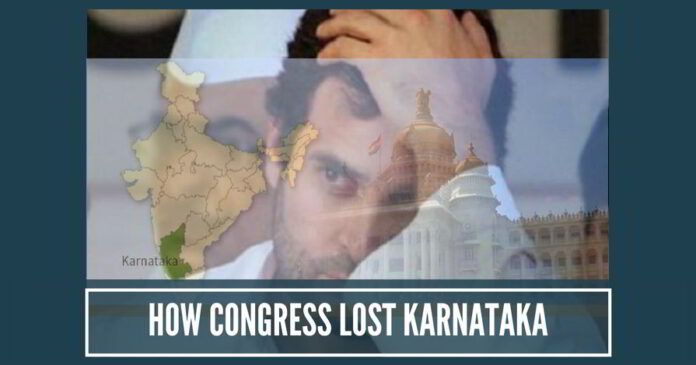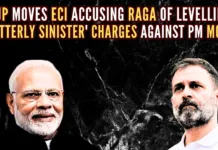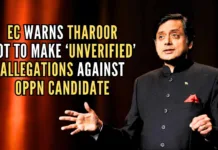
Congress needs to shed its core message of socialism and expunge identity politics from its DNA.
The writing was on the wall and there were early signs too. Three months ago, the State Government’s own intelligence report had indicated that “more than 40 MLA’s are facing strong anti-incumbency”. Though there was no anti-incumbency against Chief Minister Siddaramaiah and Congress government, voters were nevertheless unhappy with its performance.
Mr. Siddaramaiah’s socialist ideology and policy prescriptions based on such an ideology were essentially a throwback to the 1970’s time of Mrs. Indira Gandhi – identity politics and populism. On the day of his swearing-in ceremony as the Chief Minister, Anna Bhagya scheme – rice at Rs 1 per Kg – was announced to BPL cardholders. And in the very first year of his office, he followed it up with various Bhagya schemes catered to the “AHINDA” community believed to be instrumental in Congress getting an absolute majority in 2013.
Despite untrustworthy and corrupt local leadership in the state, voters were convinced about BJP’s ability to deliver on its promises.
Further, Mr. Siddaramaiah, with a slew of administrative actions, angered all communities. He stacked Kurubas in several powerful administrative positions in Old Mysore region angering Vokkaligas. Veerashaiva-Lingayats were enraged with Government’s decision of recommending a separate religion status to Lingayats. Dalits were extremely unhappy since they saw no improvement in their standard of living over the five years. And finally, minorities were dejected because the Congress party takes them for granted and this Congress administration was no different.
However, it is after all the twenty-first century and Karnataka’s large youth population proved decisive in the 2018 election. Youth voters found identity politics repulsive. Congress thus lost the youth and swing votes of various communities ensuring its defeat.
The whirlwind campaign of Prime Minister Modi in the final days before election forced the Congress party to commit another strategic blunder. Egged on by supporters on social media, the party used the assembly election as a way to project its President as Prime Ministerial candidate for the 2019 Parliament election. Thus both Mr. Siddaramaiah and Mr. Rahul Gandhi were countering Mr. Modi’s allegations and accusations in election rallies and lost the plot miserably. With a few days left for the election, both leaders realized the futility of this exercise. Mr. Siddaramaiah acknowledged as such, rather belatedly, through his tweet “I am not in competition with Prime Minister. I challenge Mr. Yeddyurappa to a 15-minute debate”. This sudden U-turn for a debate by the sitting Chief Minister indeed flummoxed the voters.
The Bharatiya Janata Party (BJP) was extremely well prepared with their playbook for this election. Despite party giving tickets to the old guard of 2008 who misgoverned and looted the state, they managed to make Prime Minister Narendra Modi and party President Mr. Amit Shah Face of this election. And Prime Minister Modi’s rallies were organized strategically to woo young voters, reassure Veerashaiva-Lingayat community of BJP’s commitment to the community and to connect with undecided voters who could be convinced to vote for the party. Thus Mr. Modi visited coastal Karnataka just once where the local party leaders assured him of victory and avoided Old Mysore region completely where the BJP was extremely weak and with little to gain from Prime Minister’s presence.
Moreover, Prime Minister Modi stuck to the mantra of development and attacking the Congress leadership in all rallies. BJP’s message to the youth and swing voters was development while to the old guard was to deliver government services efficiently by improving administration and curbing corruption. Prime Minister Modi’s oratory skills indeed charmed the voters like no other politician. Despite untrustworthy and corrupt local leadership in the state, voters were convinced about BJP’s ability to deliver on its promises.
So, what does the Karnataka election foretell about prospects of BJP and Congress in the parliamentary election to be held in May 2019?
The regional outfit Janata Dal (Secular) once again failed to cross the 50 seat mark and the 21% voter share threshold. Like in 2013, the party’s over-reliance on Mr. HD Kumaraswamy to bring votes proved to be ineffective. JDS with its over-reliance on rural vote base had no message for young and swing voters. The party relentlessly focused on its promise of farm loan waiver within 24 hours of coming to power and populist guarantees of cash to old aged and pregnant women that had very little appeal beyond farmers and pensioners. Youth were disgruntled and dismissive of the party. According to C-Voter exit polls, more Muslims voted for BJP than JDS. The alliance with Uttar Pradesh based Bahujan Samaj Party (BSP) also failed to enthuse Dalit voters to vote in favor of the alliance.
So, what does the Karnataka election foretell about prospects of BJP and Congress in the parliamentary election to be held in May 2019? It reinforces the fact that Prime Minister Modi’s charisma and credibility are intact and the youth of India are indeed attracted to him like no other leader. The BJP’s party machinery too is a well-oiled machine that can deliver votes in most states in the country.
On the other hand, Congress party needs transformation both in message and organization. The party needs to shed its core message of socialism and expunge identity politics from its DNA. Also, it needs to overhaul its electoral strategy and not rely on outside organizations and associations to deliver votes. With a year left, it remains to be seen if current leadership can herald on such a makeover to mount an effective challenge to the BJP in 2019.
Note:
1. The views expressed here are those of the author and do not necessarily represent or reflect the views of PGurus.
- Biggest Economic Accomplishment – Ending Crony Capitalism - December 13, 2019
- Mr. Rahul Gandhi must first become a Chief Minister - April 4, 2019
- How Congress lost Karnataka - May 15, 2018











[…] not Mr.Kapil Sibal who roared before that court 2 weeks ago only to withdraw the case. Again, the Congress and JD(S) are roaring for no […]
I thought Amit Shah did not perform as expected. There was no clear narrative from BJP this time. Karnataka BJP has an image problem. But it was Rahul Gandhi’s error that he chose to target centre more than state BJP. If BJP had succeeded in portraying a win in Karnataka was integral to its plans it would have had a clear majority.
Nothing is good if party ideology is good and its people are IMMORAL,INCOMPETENT,BIGOTS and Who believe in DIVIDE n RULE !!